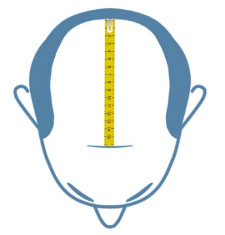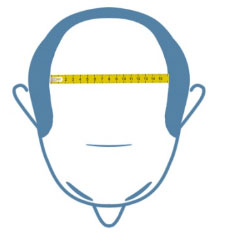
The Lavivid New Year Sale has great deals on men’s hair systems that will help you change your look for 2024.

Hair replacement, a term that resonates with the promise of transformation and renewal, holds a special significance for those on a challenging journey – cancer patients. During their courageous battle against this formidable adversary, many cancer patients confront a formidable companion: hair loss due to chemotherapy. This physical manifestation of the treatment’s side effects can have a profound emotional impact, shaking the foundations of self-esteem and self-identity. It is in this context that the concept of hair replacement emerges as a beacon of empowerment and healing.

The journey of a cancer patient is a testament to resilience and hope, a path filled with trials and triumphs. Amidst the physical and emotional turbulence they endure, hair loss can emerge as an unexpected and formidable foe. The sudden transformation in appearance often intensifies the emotional toll of the illness. While the focus primarily lies on the medical aspects of treatment, the emotional well-being of patients also warrants attention. This is where the profound significance of hair replacement comes into play.
In this comprehensive exploration, we venture into the world of hair replacement for cancer patients. Beyond being a cosmetic solution, it serves as a source of empowerment, healing, and emotional support for those undergoing cancer treatment. Our journey unfolds in four essential steps, each revealing a facet of the transformative power of hair replacement in the lives of cancer patients.
The Emotional Impact of Hair Loss
Hair loss is more than just a physical issue; it also deeply affects the emotional sphere, particularly for cancer patients receiving chemotherapy. The psychological effects of hair loss during cancer treatment are a significant and frequently overlooked part of the experience. Hair is deeply connected to one’s identity, self-esteem, and general well-being; it is not only an aesthetic choice. The emotional toll that cancer patients experience when they accept that they will lose hair can be severe.
The moment when a patient notices the first strands of hair falling can be a profound and distressing experience. It marks a visible symbol of the illness’s impact, and the reflection in the mirror may no longer align with the image they recognize. As the physical appearance of hair loss erodes self-esteem, a person’s sense of self may disappear. The ensuing emotional turbulence is complex, involving emotions such as vulnerability, anxiety, and a lack of control over one’s own body. For some, it’s a constant reminder of the battle they are waging against cancer, which can be emotionally exhausting.
The emotional impact of hair loss during cancer treatment extends to various aspects of a patient’s life. Interactions with loved ones, friends, and colleagues can become strained as patients grapple with their altered appearance. Social outings and public appearances may be approached with trepidation, leading to a sense of isolation. The emotional toll often permeates the very core of a patient’s resilience, affecting their ability to cope with the challenges of treatment. Recognizing the deep-seated emotional impact of hair loss is the first step toward understanding why hair replacement holds such potential for empowerment and healing. It is a facet of the cancer journey that calls for sensitivity, support, and, ultimately, solutions that not only address the physical effects of treatment but also nurture emotional well-being.
The Role of Hair Replacement
In the complex and often turbulent landscape of cancer treatment, where patients grapple with both physical and emotional challenges, the role of hair replacement transcends mere aesthetics. It emerges as a formidable ally in the fight against not just the disease itself but the collateral damage it inflicts – the loss of hair due to chemotherapy. Hair replacement assumes a multi-faceted role, one that extends far beyond cosmetic concerns, as it undertakes the mission of rekindling hope and empowerment in the lives of cancer patients.
At its core, the primary role of hair replacement lies in restoring a sense of identity and dignity to those who confront the emotional turmoil of hair loss. Custom-designed hairpieces, meticulously crafted to mirror the individual’s natural hair in terms of color, texture, length, and style, serve as powerful instruments of self-expression. These hair systems are not mere accessories; they become integral facets of the patient’s identity. The attachment methods, often employing hypoallergenic adhesives, ensure that the hair system offers a secure and comfortable fit, making it virtually indistinguishable from the patient’s hair. Thus, the primary role of hair replacement is to furnish cancer patients with the means to regain a semblance of normalcy amid an otherwise tumultuous journey.
Yet, the significance of hair replacement extends beyond the realm of aesthetics. Hair loss transcends the physical; it delves deep into the core of self-esteem and self-image. The restoration of a full head of hair is not a mere superficial transformation; it is an act of emotional healing. The rejuvenation of one’s appearance carries profound implications for bolstering self-esteem and reviving self-confidence, which are often eroded during cancer treatment. By facilitating the restoration of a complete head of hair, hair replacement empowers cancer patients to confront the world with renewed courage and resilience.
Choosing the Right Hair Replacement
Selecting the right hair replacement solution is a pivotal decision for cancer patients. This step in the journey involves a nuanced consideration of several factors, including the type of hair system, the method of attachment, and the degree of customization. These choices should be aligned with the individual’s preferences, comfort, and specific requirements, ensuring that the hair replacement solution not only addresses hair loss but also resonates with their unique identity and lifestyle.
One of the primary considerations in choosing the right hair replacement is the type of hair system. Cancer patients can opt for hair systems crafted from premium human hair or advanced synthetic blends. Human hair offers the most natural look and feel, closely mirroring the patient’s hair. In contrast, synthetic hair systems are often more affordable and offer a wide range of styles and colors. The choice between these options depends on the patient’s aesthetic preferences, budget, and the level of realism they desire.
Another crucial aspect to contemplate is the method of attachment. Hair replacement offers versatility in this regard, with options such as adhesive or tape attachment. Adhesive attachment provides a secure and long-lasting hold, ensuring that the hair system remains in place, even during various activities. Tape attachment, on the other hand, is known for its ease of application and removal, offering a practical solution for those who value convenience. The choice between adhesive and tape attachment hinges on the patient’s lifestyle and comfort levels, and it is often recommended after consulting with a professional salon.
Customization is a key element in the hair replacement journey. The degree of personalization is a testament to the versatile nature of this solution. Cancer patients have the liberty to select the attributes that define their hairpiece, including color, texture, length, and style. This meticulous tailoring ensures that the hairpiece seamlessly blends with their natural hair and resonates with their unique identity. The involvement of skilled technicians is pivotal in achieving this level of customization, as they ensure that the hairpiece is custom-fitted to the patient’s scalp, resulting in a snug and highly personalized fit.

The Empowering Journey
The final step in our exploration celebrates the empowering journey that hair replacement offers to cancer patients. It’s a path of recovery, resiliency, and self-awareness. Beyond just cosmetics, hair replacement helps people emotionally heal and gives them the self-assurance and dignity they need to confront the trials of cancer treatment. Regaining a full head of hair aids in the healing process by giving cancer sufferers a sense of normalcy and confidence. This inspirational story demonstrates the positive impact hair replacement therapy may have on cancer patients by giving them newfound hope, resilience, and self-worth.

Conclusion
The article has delved into the profound significance of hair replacement for cancer patients. It has unveiled the emotional impact of hair loss during treatment and emphasized the pivotal role of hair replacement in empowering patients and restoring their self-esteem. The article has also highlighted the importance of choosing the right hair replacement solution, considering factors such as the type of hair system, method of attachment, and customization. Ultimately, the decision to embark on the journey of hair replacement is a testament to the resilience and determination of cancer patients. It is a journey of healing, self-discovery, and empowerment, offering hope and renewed confidence in the face of adversity. To learn more, click on https://www.lavividhair.com/





Comments (0)